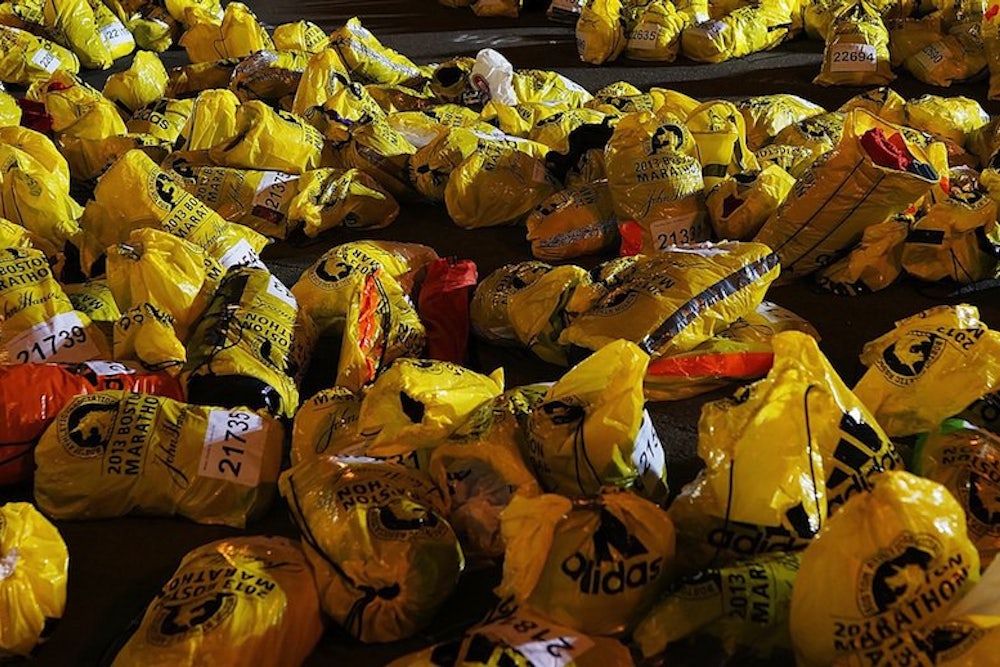When disaster and tragedy used to strike, most of us turned on the network news. Now, many of us turn to social media. So it was for me after Hurricane Sandy and Sandy Hook, when Twitter was a vital stream of information, a way of partitioning suffering into more easily digestible updates. And so it began again on Monday, after the bombing of the Boston Marathon. In the initial aftermath of the attack, I was glued to Twitter. And yet, as details of the carnage emerged, I found myself logging on to Facebook instead. This was not the newshound in me, but the lifelong Bostonian who didn't care in this case about a national perspective on the events, but rather the personal specifics. When tragedy strikes elsewhere in the world, we sign onto Twitter. When it hits home, we sign onto Facebook.
This may seem like a meaningless distinction, and yet I think it says something about how we experience and relate to tragedy. Though I live in Watertown now, a few short miles outside of downtown Boston, the feeling of slight geographic remove complicated the way I watched events unfold. My first instinct was to run downtown to experience things firsthand, but the confusion and misinformation about multiple other bombs throughout the city, including a supposedly suspicious package found near the train station I would've normally taken to get there, kept me at home. It might as well have been taking place hundreds of miles away. I've never felt so far away from my city. So I sat in front of the computer, impotently, contemplating the unanswered invitation on my dining room table to a party at a hotel where a third bomb was said to have been found, and waited for the news of the personal to rear its head.
Unlike Twitter, which might be a great way to find out in real time what our favored celebrities think about a tragedy, it's Facebook where are our actual friends and family live. We complain about our newsfeeds a lot, overloaded as they are with baby updates and brunch photos and other depressing Cartesian annunciations to the world of our existence. But on Monday, as I wondered whether my friends and family and neighbors might have been harmed in the attack, it became a lifeline. I've never been so happy to be blissfully bored by a typical day's Facebook output. Each status update from a Boston friend was a blessing. The subtext of every “Oh my god, did you see this?” was a declaration of life.
These friends were using Facebook similarly. “I didn't see you post on Facebook all day and I got worried,” a handful of them emailed and texted, feeling the same sense of social media-induced dread about my silence. The messages on Facebook from friends, both intimate and far-flung, coalesced around a single question: “Are you OK?”
Was I, in fact, OK? “As far as I know, so far, I am,” I've been responding. The problem is some of us still don't know. Boston may be a major city, but it's also a really small town. It would be impossible for anyone from here to not know dozens of people directly involved in the event in one way or another. At least three people are dead, and over 140 were injured at last tally. The overlap is inevitable, it's just a matter of how hard it's going to hit.
It was hard all day and night to answer the question without complete information. On Twitter, there were reports of additional bombs—as many as seven others, including a potential connection to a fire at the JFK Library. Most of that turned out to be overstated, thankfully, although over night, the picture didn't become much clearer. What did grow gradually clearer, thanks to Facebook, were the only questions that seemed to matter: Who made it? Who didn't? Twitter can give you the world, but it can't give you the backyard.
On Facebook, I learned not only that my loved ones were alive, but also of the friend whose father was at the finish line when the bomb exploded; the friend whose loved one lost a leg; and the friend who ran a few miles to her apartment after cheering on another mutual participant. Colleagues spoke of being unable to reach siblings and parents. Each pleading query for news both complicated and lessened the agony of riding out the storm from afar as I began checking off names in a morbid sort of inventory-taking.
As the national news picture begins to fill in the details of what happened, it's the personalized, localized newsfeed that I can’t look away from. Am I OK? I honestly don't know yet, but with every status update that comes across the newsfeed I get a little bit closer to being able to answer.
Luke O'Neil is a freelance journalist in Boston. His work appears in Esquire, the Boston Globe, Slate, the Wall Street Journal, Vice and others. Follow him on Twitter at @lukeoneil47.
